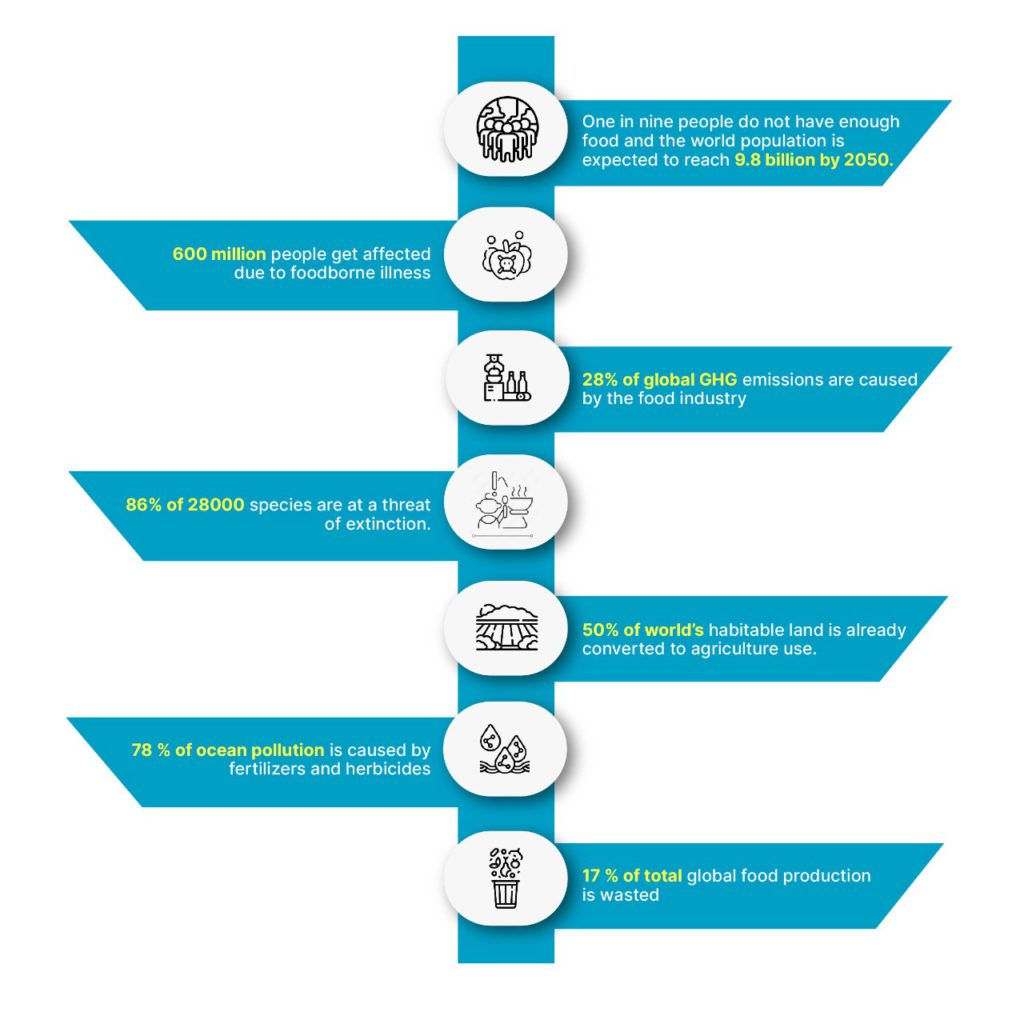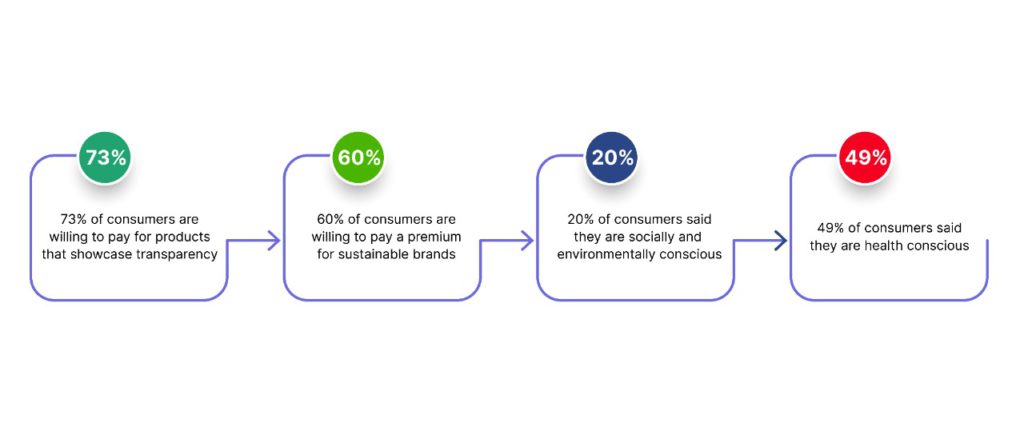Contact: +91 99725 24322 |
Menu
Menu
Quick summary: The food supply chain is fragmented with the participants operating in silos with mistrust. Blockchain is a promising solution to standardize the food ecosystem with enhanced trust and cohesive alignments. Blockchain enabled platforms can help manage stakeholders that work in different capacities to make climate related sustainable development possible with a transparent and traceable network.

Today, when environmental challenges are at the forefront of global concerns, innovative solutions are needed to drive sustainability and combat climate change. Blockchain technology has a immense potential to revolutionize sustainability, from enhancing traceability and transparency to promoting renewable energy and sustainable supply chains.
According to a report by PWC, blockchain has the potential to reduce greenhouse gas emissions by 16.5 gigatons by 2030, contributing to global efforts in combating climate change.
In this blog post, we will explore the various ways in which blockchain technology is revolutionizing sustainability, paving way for a greener and resilient future. Join us as we delve into the exciting realm of blockchain and its transformative impact on our planet.
The food supply chain is fragmented with the participants operating in silos with mistrust. Blockchain is a promising solution to standardize the food ecosystem with enhanced trust and cohesive alignments. Providing secure, efficient, transparent and sustainable supply chains will benefit the stakeholders in the food ecosystem.
The global Blockchain in agriculture and food supply chain market is estimated at USD 133 million in 2020. It is expected to grow at a CAGR of 48.1% to reach USD 948 million by 2025. The increasing demand for product provenance by consumers, product track and trace requirements by other stakeholders and the need for climate resilient sustainable practices in the industry is driving blockchain technology.

We need to produce a lot more with a lot less, giving the nature a much-wanted break. An Agritech revolution with blockchain solutions decouples food production with environmental degradation providing the food security. Traditional farming practices often contributes to deforestation, soil degradation, water pollution and greenhouse gas emissions. However, by harnessing the power of blockchain technology, the agriculture industry can undergo a transformative shift. Blockchain’s transparency and immutability enables the creation of a trusted and decentralized platform that fosters sustainable practices across the entire food supply chain. Through blockchain-enabled traceability, farmers, producers and consumers can easily track the journey of food products, ensuring they are sourced responsibly, produced sustainably and transported efficiently.
This transparency promotes accountability and encourages environmentally friendly practices, reducing the negative ecological impacts associated with conventional agriculture.
Blockchain technology is a decentralized, distributed ledger that records the provenance of a digital asset. It makes the history of the asset transparent and unalterable through its decentralized and hashing features. A blockchain stores encrypted block of data chained together to form a single source of truth for the data. The distribution of digital assets creates an immutable record of data, and the decentralized access provides real-time access and transparency. The transparent ledger builds trust among entities and provides integrity of the records. Data integrity can be maintained using public/ private key cryptography which can verify who initiates transactions and if they are authorized to do so.
Blockchain is a revolutionary technology that creates time-stamped records of transactions reducing risk, eliminating fraud and delivering transparency in a scalable way. Elimination of intermediaries, increased automation in supply chain management and tackling environmental issues with blockchain should see greater opportunities in the coming years. Blockchain creates a shared platform for transaction and information flow, monitoring all the entities in the food supply chain. Each entity has a copy of the immutable ledger that prevents fraud and establishes transparency in the network. The end-to-end information from the source to consumption brings visibility into the system and fosters global trust and sustainability.
Capturing and Tracking and Tracing the product history from Source to Consumption establishes a digital identity to the product. The data regarding the origin of food, the best practices deployed in its production and processing, the conditions under which it was grown along with the environmental impact and the fair-trade practices followed brings transparency in the system assuring consumers of a sustainable, trustworthy and a safe product. The shared platform connecting all the stakeholders provides transparency, traceability, accountability and compliance in the network.

Resource efficient systems are very critical to achieve sustainability. Blockchain coupled with IoT helps in making farming a sustainable practice with optimum usage of input resources. Water, Soil, Seed , Fertilizers and Labour form the input resources which needs to be utilized effectively. Increasing agriculture productivity through adoption of practices that conserve biodiversity and the natural resources result in enforcing sustainability. Tracking these inputs through farm management software helps to validate the sustainable claims and ensure an authentic product. The decentralized management helps the stakeholders to make informed decisions.
Verifying the origin of raw materials, learning about the production processes is vital to promote sustainability and minimize risks due to food contamination and environmental changes. Blockchain provides farm to fork transparency assuring food safety and adherence to quality standards. The real-time capture of data helps to identify problem spots and aid targeted product recalls
Measurement and management of GHG emissions can be realised through smart contracts in blockchain. The real-time, trustworthy data provides transparency and accountability. It helps organizations in sustainability reporting, improving their performance and making informed decisions. This could also help in GHG accounting for carbon taxation
Blockchains help to automate and accelerate impact measurement and verification through the decentralized approach which is normally slow and expensive in a traditional system. Blockchain smart contracts offer a tamper-proof and affordable mechanisms to connect environmental changes to financial incentives. For example a measurable reduction in carbon dioxide emissions with the aid of sensors can trigger the release of a crypto to that place.
The carbon market can play a critical role in achieving the global climate goals of halving the emissions by 2030 and reaching net-zero by 2050. Protecting the integrity of the carbon market is crucial and blockchain provides the right solutions in this regard. Transparency and trust are the underlying factors that help build clear sustainability road maps. The use of blockchains reduces reputational risk from unverifiable claims and provides enhanced security, improved traceability, increased speed and efficiency with reduce costs.
The interest in carbon reporting, carbon sequestration and carbon capture leveraging the voluntary carbon markets has opened opportunities for green digital asset solutions that can be tokenized and used as commodities in the carbon market system. NFTs are being leveraged for climate change and they are used as an immutable record for impact and carbon credits.
Carbon offsets are expected to skyrocket to $550 billion by 2050 as the world works toward a more sustainable future.
Materials and natural resources can be valued, used and traded, incentivizing organizations to realize financial value from things currently wasted or discarded. Blockchain can tokenize natural resources and give them a unique digital identity that can be traded. Blockchain can turn Circular economy into a developed ecosystem.
Technology start-ups play a critical role in developing blockchain platforms that bring together all the stakeholders including government, regulators and consumers. The individual efforts of organizations are translated into a networked effort that creates a win-win for all. Innovations in blockchain technology are powerful enablers for fighting climate change. Reaching net zero by 2050 will need a herculean effort to accelerate the transit to a low carbon economy and blockchain solutions are the answer to this.
Many organizations are implementing green projects as part of their climate action. They believe going carbon neutral or offsetting carbon would contribute to their efforts. The current carbon markets are not monitored and regulated. Blockchain enabled platforms can help manage stakeholders that work in different capacities to make climate related sustainable development possible with a transparent and traceable network.
Blockchain technology is uniquely positioned to help the carbon market’s expansion by making it accessible and solving the transparency problem in the voluntary market while opening up mandatory markets too. Millions of people globally are keen to reduce their ecological footprint and blockchain can facilitate this by unlocking its potential to drive a carbon-neutral future.
TraceX is at the forefront of empowering companies on their sustainability journey with its innovative blockchain solutions. Through TraceX blockchain solutions, companies can establish end to end traceability in their supply chains, ensuring transparency, accountability and ethical sourcing. This not only builds consumer trust but also helps companies identify areas for improvement and implement targeted strategies to reduce their environmental footprint. Trace Carbon facilitates tracking and management of carbon emissions, promoting sustainable farming practices and supporting initiatives that mitigate impact of climate change. With secure and reliable data management, TraceX ensures credibility and integrity of information, enabling companies to make data driven decisions and accurately report on their sustainability performance.
Conclusion
In conclusion, blockchain technology is revolutionizing sustainability by providing innovative solutions to address environment and social challenges. Its ability to establish trust, transparency and immutability within systems is transforming industries, including agriculture, supply chain management and more. By harnessing the power of blockchain, companies can enhance their environmental impact assessments, promote responsible resource usage and drive positive change in their operations. Collaboration, data sharing and decentralized networks further foster collective action for a more sustainable future.
